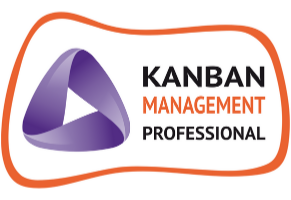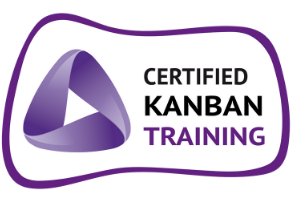Description
Are you struggling with implementing Agile in your organization? Are your teams overburdened and less productive but still too resistant for a revolutionary change?
Choose the “Alternative Path to Agility” and implement an evolutionary and humane Change Management Method which doesn’t change your process but improves it.
The Kanban Method provides pragmatic, actionable, evidence-based guidance for successful evolutionary change. It starts with what you do now and respects current roles, responsibilities and job titles. This allows organizations to evolve business processes gradually, define and use relevant metrics to measure progress, and significantly reduce the risk associated with complex change programs.
This 4-day hands-on course follows the official Kanban University (KU) training materials produced by David J Anderson, Mike Burrows and other leading Kanban experts.
In the course, you will be involved in regular hands-on exercises and discussions that will focus on the daily operation of a Kanban system and how to extend the kanban system boundary and include multiple value streams.
You will consider what type of Kanban initiative is most appropriate for your organization and how to manage and evolve it over time.
You will learn how to improve agility with asymmetrical commitment and cadences.
Who Will Benefit?
Kanban works across multiple functions of an organization, from senior members of staff looking to adopt Lean Management to members of delivery teams willing to improve their working practices. Previous KMP attendees have been in roles such as:
- Senior Managers
- Program and Project Managers
- Product Managers, Product Owners and Business Analysts
- Scrum Masters, Team Leads and Change Agents
- Product & Software Developers & Testers
- Agile Coaches & Practitioners (Scrum, XP, DSDM, AgilePM, etc.)
- Other roles such as HR and Finance professionals
Topics Covered
The course follows the official KU Certified Kanban syllabus. During the two days, you will have ample opportunities to discuss and experience the following topics:
Day 1&2:
Meet and Experience Kanban
- Experiential simulation using Okaloa’s Flowlab for a deeper understanding of Kanban for learners of all backgrounds and experience levels.
Definition of Kanban
- Foundational Principles (Change Management and Service Delivery)
- Core Practices
- The Kanban Lens
- The Kanban Values
- Service orientation
Understanding Kanban
- Visualisation
- Pull-Based Systems
- Commitment in Kanban
- Replenishment and Planning
- Delivery of Products
- Lead and End-to-End Cycle Times
- Little’s Law
- Cumulative Flow Diagrams
- Flow Efficiency
- Metrics in Kanban Systems
Introduce Kanban
Review of a case study as well as practical work with examples of the participants in the design of a Kanban system based on the System Thinking Approach to Implementing Kanban
Implementing Kanban
- STATIK – Systems Thinking Approach to Implementing Kanban
- Understanding Sources of Variability
- Identifying Opportunities to Improve
- Analyzing Demand and Capability
- Modelling Workflow
- Designing a Kanban System
- Work Item Types
- Classes of Service
- Motives for change
Kanban Board Design
- Designing Kanban Ticket
- Examples of Visual Kanban Boards
Kanban System Design Integration
The course will reinforce the concepts learned through the design of a Kanban System in their context. Students will be challenged to develop, refine, and utilize their own Kanban to drive decisions and facilitate performance improvements. Learning will be very interactive and hands-on.
Day 3&4:
- Review and explore the motivations for the Kanban method
- Examine and recognize emotional objections to WIP limit introduction
- Assess and interpret the Kanban value system, commitment and replenishment
- Investigate Kanban at scale, understanding the organization as a network of services
- Introducing an enterprise-level Kanban case study
- Identify an evolutionary approach to change management
- Investigate Fitness for purpose, KPIs, and metrics
- Implement organizational feedback loops with Kanban cadences
- Further analysis of the enterprise-level Kanban case study
Prerequisites
Prior to the training, it is recommended to read one of these two books:
- Kanban by David J. Anderson
- Kanban from the Inside by Mike Burrows
We provide the “Kanban” e-book by David J Anderson for free and a 50% discount on the “Kanban from the Inside” e-book by Mike Burrows to all registered participants.
What you’ll learn
- Kanban University’s certified training curriculum and teaching methods were created through the collaboration of leading experts and validated in hundreds of training classes around the world.
- You get pragmatic, actionable guidance you can implement in your organization next week – because it doesn’t require permission, a large budget or getting others to change.
- You will receive training from an Accredited Kanban Trainer, who has experience teaching and coaching Kanban within several organizations.
- Profile listing on the Kanban University (KU) alumni page.
What You Get
- You will receive training from an Accredited Kanban Trainer, who has experience teaching and coaching Kanban within several organizations.
- You will receive a KMP Credential on course completion from Kanban University (KU) as well as membership of KU. The Credential is for lifetime and doesn’t need to be renewed.
- Profile listing on the Kanban University (KU) alumni page.
Professional Development Units (PDUs) and Scrum Education Units (SEUs)
- Attendees may be eligible to apply for 32 PDUs toward their continuing education requirements with the Project Management Institute (PMI) for PMP, PgMP, and PMI-ACP certifications
- Scrum Alliance SEUs: 32 SEUs for 4-day Kanban System Design Course





